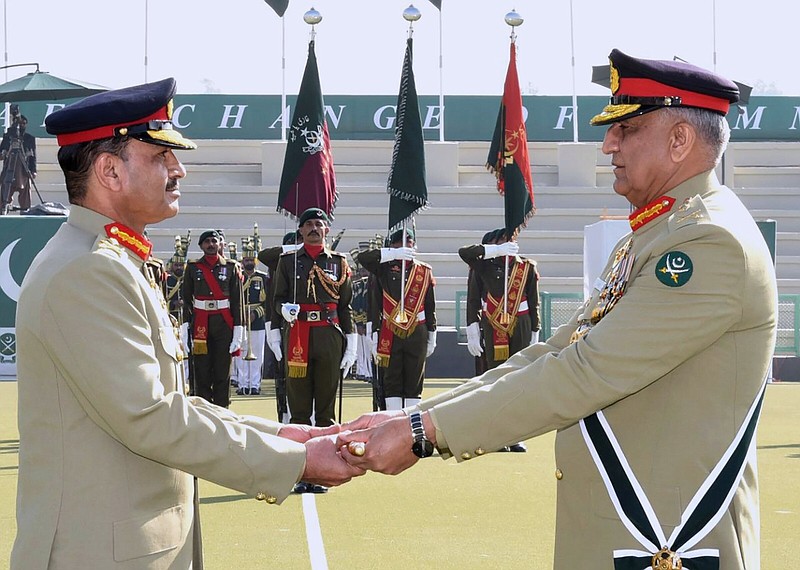ISLAMABAD -- Pakistan's new military chief took command of the country's armed forces Tuesday, one day after a renewed threat from a key militant group behind scores of deadly attacks over 15 years.
The army has historically wielded influence in Pakistan, ruling it for half of the country's 75-year history. But it has also been fighting homegrown and foreign militants since 2001, when Pakistan became an ally of the United States in the war on terror.
One of the key challenges faced by the country's new army chief, Gen. Asim Munir, will be how to respond to the latest threat from the Pakistani Taliban which has ordered its fighters to resume attacks across the country. The military has also been fighting separatists in the southwest.
The Pakistani Taliban is a separate group but is allied with the Afghanistan Taliban, who seized power in Afghanistan more than a year ago as the U.S. and NATO troops were in the final stages of their pullout. The Taliban takeover in Afghanistan emboldened Pakistani Taliban, whose top leaders and fighters are hiding in Afghanistan.
Munir, who is a former spymaster, replaced Gen. Qamar Javed Bajwa, who has retired from the post after a six-year term. Bajwa, during his tenure, had approved a series of operations against the militants to evict them from the country's former northwestern tribal regions bordering Afghanistan.
Bajwa also opened peace talks with the Pakistani Taliban earlier this year.
The Pakistani Taliban had agreed to an indefinite cease-fire in May after talks with Pakistan's government and military officials in Afghanistan's capital, Kabul.
The Pakistani Taliban ended the cease-fire Monday, vowing new attacks in a statement.
That has raised fears of violence in Pakistan, which has witnessed scores of deadly attacks, mostly claimed by the umbrella group of several militant factions.
Hina Rabbani Khan, the country's deputy foreign minister, traveled to Kabul on a planned visit. She was expected to discuss a range of issues, including the latest threat from the Pakistani Taliban, in her talks with government officials.
Tuesday's change in military command comes days after Prime Minister Shahbaz Sharif named Munir to replace Bajwa, who handed over his traditional "baton of command" to Munir at a ceremony amid tight security in the garrison city of Rawalpindi.
Munir was promoted to four-star general by Sharif last week to replace Bajwa, who retired at the height of his unpopularity. Bajwa emerged as one of the most controversial army chiefs this year when opposition leader Imran Khan accused him of ousting his government as part of a U.S.-led plot, a charge Sharif, the United States and the military have denied.
In his speech, Bajwa congratulated Munir and hoped that during his tenure the country's defense will be further strengthened. Bajwa served in the military for 44 years.
Khan, a former cricket star turned politician, was ousted in a no-confidence vote in Parliament and he wants new military leadership to end the political turmoil. The army chief is widely seen as the de facto ruler in Pakistan.
Munir's approach to the lingering political feud was unclear.
Munir has assumed the command of the military amid a deadlock between Khan and Sharif who says the next polls will be held as scheduled in 2023. The military so far has publicly said that it will not play a role in politics, meaning it was up to Sharif's government and Khan to resolve any political issues.
Khan was shot in the leg Nov. 3 by a gunman when he was marching toward the capital, Islamabad, from the eastern city of Lahore in a convoy of thousands to pressure Sharif to resign and agree to the new vote. One of Khan's supporters was killed and 13 were wounded in the attack last month and the gunman was arrested.
Meanwhile, the military claimed it killed 10 "terrorists" in a raid in the Hoshab district of Baluchistan province Tuesday. In a statement, it provided no details, including the men's identities or what led them to label the men as terrorists. A military spokesman reached by phone also had no additional details.
For nearly two decades, Baluchistan has been the scene of a low-level insurgency by separatists demanding independence from the central government in Islamabad. The government says it has quelled the insurgency, but violence in the province has persisted.
Information for this article was contributed by Abdul Sattar of The Associated Press.
